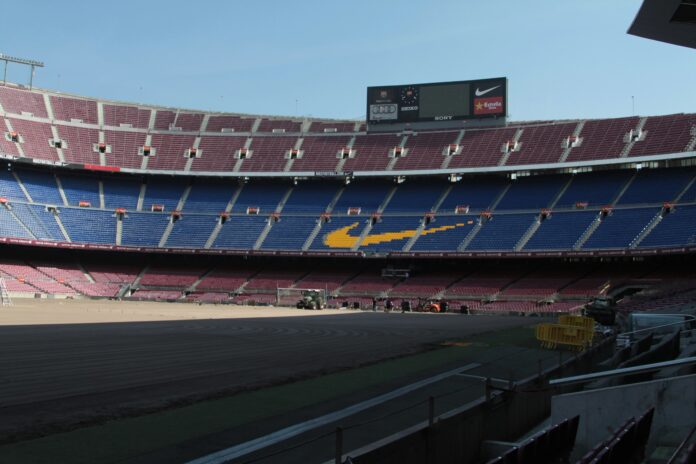Introducción
A medida que se acercan los Exámenes de Agentes de Fútbol de la FIFA de 2024, programados para el 22 de Mayo y una fecha no confirmada en Noviembre, los aspirantes a agentes de fútbol se están preparando para un momento que definirá sus carreras. Tanto para aquellos que quizás estén intentando el examen nuevamente este año como para aquellos que estén comenzando su preparación desde cero, hay cambios cruciales en el contenido examinable que los candidatos deben tener en cuenta. En este blog, explicaremos cómo funcionará el examen de este año y cuál es la mejor manera de prepararse utilizando los Materiales de Estudio de la FIFA o mejor llamados “Recursos Didácticos para el Examen de la FIFA para agentes de fútbol.”
Puntos Clave Sobre el Propio Exámen de la FIFA
El exámen de la FIFA para Agentes de Fútbol de 2024 sigue generalmente los mismos procedimientos que el examen del año pasado. El primer punto a tener en cuenta es la disponibilidad limitada del exámen en solo tres idiomas: Inglés, Español y Francés. Recuerde también que ahora se requiere que los candidatos se sienten físicamente en el exámen en ubicaciones designadas bajo estrictas ‘condiciones de exámen’, y la esperanza es que en 2024 esto se organice de manera más fluida, evitando algunos de los problemas logísticos que vimos el año pasado. Es esencial que los candidatos proporcionen su propia computadora portátil y aseguren una conexión a internet estable para el examen digital. Cualquier interrupción de Internet durante el exámen podría invalidar el intento, requiriendo una nueva solicitud en una fecha posterior.
Las Asociaciones Nacionales proporcionarán lugares donde los candidatos puedan presentar el exámen en persona, con la esperanza de garantizar un entorno de evaluación regulado y adecuado. En el momento de la llegada al lugar, los candidatos deben presentar identificación personal y comprobante de pago de la tarifa de exámen. Solo se permite una computadora portátil del candidato y un dispositivo, hotspot, para crear un punto de acceso a Internet en el lugar del exámen. Otros elementos, como auriculares, dispositivos con acceso a Internet y teléfonos móviles, deben estar apagados y alejados durante el exámen. Se permiten notas personales y materiales, sin embargo, debido a la naturaleza de ‘libro abierto’ del exámen, deben ser físicos ya que el uso de software de computadora como Google está prohibido.
La FIFA está comprometida con la transparencia y el comportamiento justo durante el exámen. Por lo tanto, se aplican más reglas estándar del exámen, incluida la prohibición de comunicación entre candidatos, intentos de copiar respuestas o causar interrupciones. Salir del exámen sin consentimiento, grabar el exámen, compartir preguntas externamente o suplantar a otros están estrictamente prohibidos y serán monitoreados por administradores y vigilantes.
Requisitos de Aprobación
Una vez sentados y aceptados, los candidatos accederán al exámen en línea y tendrán un tiempo designado para completarlo. El exámen consta de 20 preguntas de opción múltiple, con un límite de tiempo de 60 minutos. Estas preguntas involucran escenarios y casos de estudio, que requieren que los candidatos seleccionen la mejor respuesta y en algunas ocasiones incluso realizar cálculos. A pesar de la naturaleza de ‘libro abierto’, el pensamiento rápido, el conocimiento previo y una técnica de navegación sólida son esenciales, dada la limitación de tiempo disponible. La puntuación de aprobación será nuevamente del 75%, o 15 respuestas correctas de 20. La FIFA tiene como objetivo mantener un exámen desafiante, similar a los años anteriores antes de la desregulación en 2015 y como se vio en 2023.
Los candidatos pueden esperar recibir los resultados de su exámen dentro de los siete días hábiles. Aquellos que no aprueben serán informados sobre oportunidades de volver a presentarse en Noviembre, o la oportunidad de revisar su intento anterior, pero el resultado no puede apelarse a menos que existan circunstancias excepcionales que afecten a muchos candidatos, como se vio en Inglaterra en Septiembre de 2023. Para los candidatos exitosos, se proporcionarán instrucciones para completar el procedimiento de licencia.
Cambios en el RFAF = Cambios en el Examen
Recuerde que los documentos dentro de los Materiales de Estudio de la FIFA son utilizados por la FIFA para generar preguntas que surgirán en el exámen. Las preguntas evaluarán el conocimiento del candidato sobre los Estatutos de la FIFA, el Código Disciplinario, el Código de Ética, el Reglamento sobre el Estatuto y la Transferencia de Jugadores, el Reglamento de Procedimiento del Tribunal del Fútbol, el Reglamento de la Cámara de Compensación, el Reglamento de la FIFA sobre Agentes de Fútbol, las Herramientas de Salvaguardia de la Infancia. Nos adentraremos en detalle en cada uno de estos temas individualmente en futuros blogs, pero por ahora es importante resaltar cómo difiere ligeramente el material examinable este año.
En 2023, todas las disposiciones del nuevo Reglamento de la FIFA Sobre Agentes de Fútbol (RFAF) fueron clave para la preparación de aquellos que esperaban aprobar el exámen. Después de la reciente circular de la FIFA suspendiendo ciertas disposiciones, esto también ha traído ajustes sustanciales sobre sobre qué deben responder los agentes en el exámen.
Lo más importante es que varias disposiciones clave en el RFAF que han sido suspendidas ya no serán examinadas en los exámenes de este año. Estas disposiciones incluyen:
Esto es vital para recordar a los aspirantes a agentes que se están preparando para los Exámenes de la FIFA para Agentes de Fútbol de 2024, ya que pueden enfocar sus esfuerzos en otros aspectos de los Materiales de Estudio de la FIFA y asegurarse de cubrir las áreas correctas. El resto del contenido principal sigue siendo esencial para el éxito. Sin embargo, los candidatos ahora pueden asignar su tiempo de estudio de manera más eficiente, sabiendo que estas disposiciones específicas no serán examinadas este año.
Resumen
El exámen es el paso más importante para convertirse en agente de fútbol licenciado por la FIFA en 2024. Esperamos que este blog y el resto de nuestros recursos puedan ayudarle a adaptar su plan de estudio a estos cambios y tener un mejor entendimiento para su preparación del exámen. Manténgase enfocado e informado, asegurándose de que su preparación se alinee con los requisitos del exámen.
No olvide, además de nuestros recursos gratuitos disponibles a continuación (más abajo) y nuevas adiciones semanalmente hasta el exámen, si desea llevar su preparación un paso más allá, nuestro próximo Curso en línea completo de 8 horas sobre Cómo Pasar el Exámen de Agente de la FIFA con el Dr. Erkut Sogut y el destacado abogado deportivo, Daniel Geey, se llevará a cabo el 20 de Abril de 2024 y está abierto para registrarse a través del enlace.
Como siempre, ¡mucha suerte a todos los aspirantes a agentes que se están preparando para los Exámenes de la FIFA para Agentes de Fútbol de 2024!
Lista de Recursos Esenciales
Habrá más por venir en las próximas semanas y meses, así que ¡asegúrese de seguir a Sports Agent Academy para más recursos útiles!







